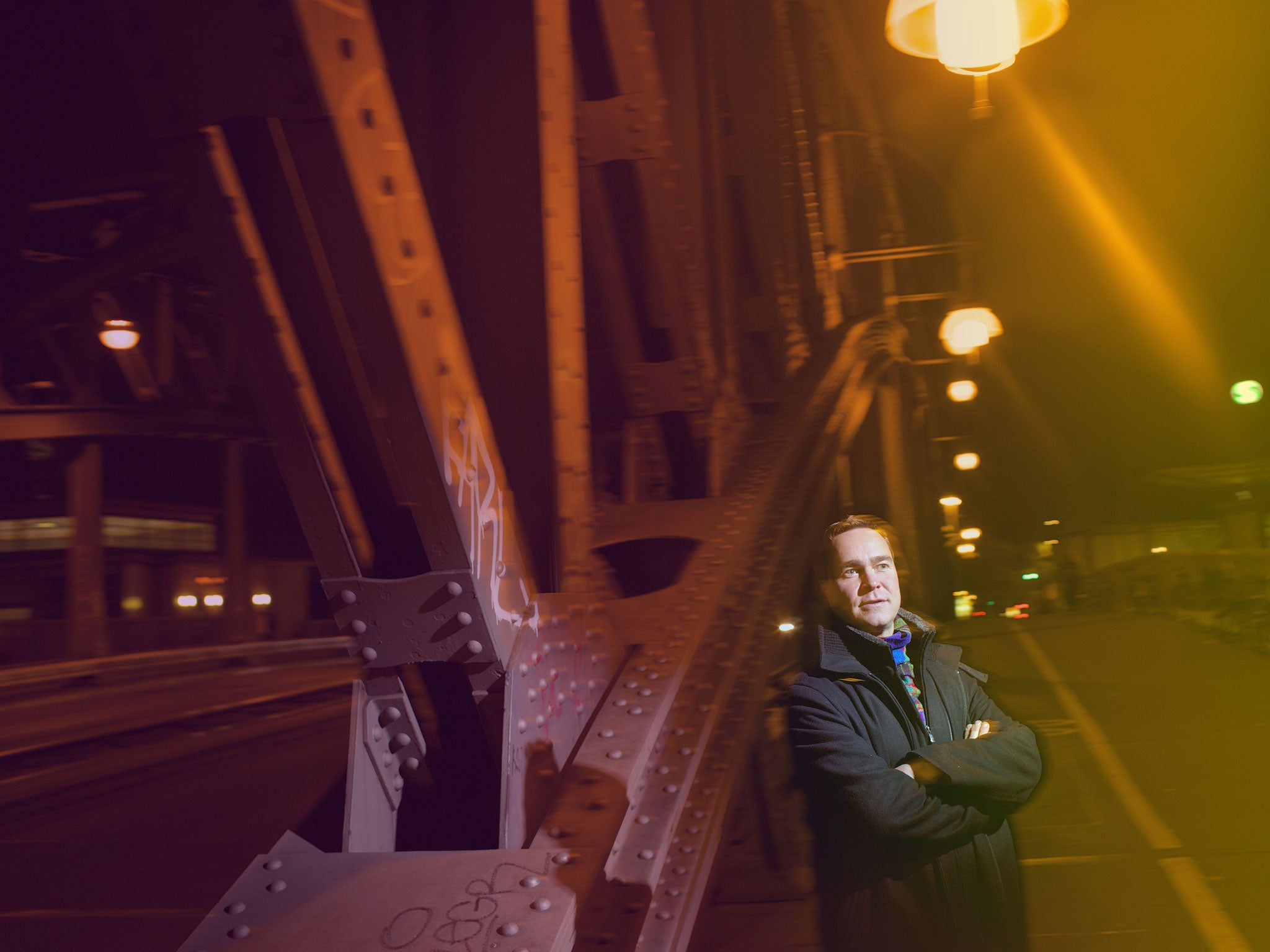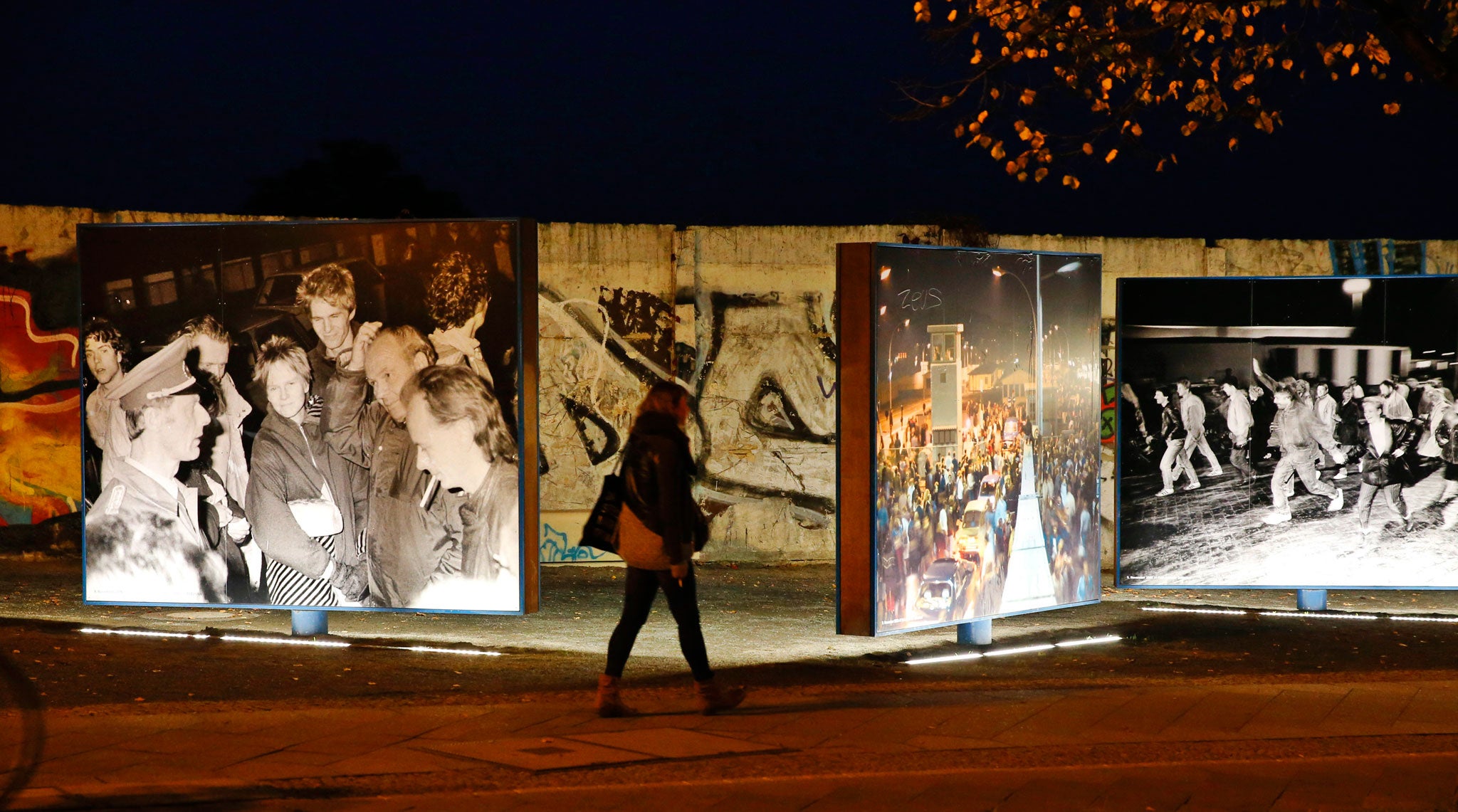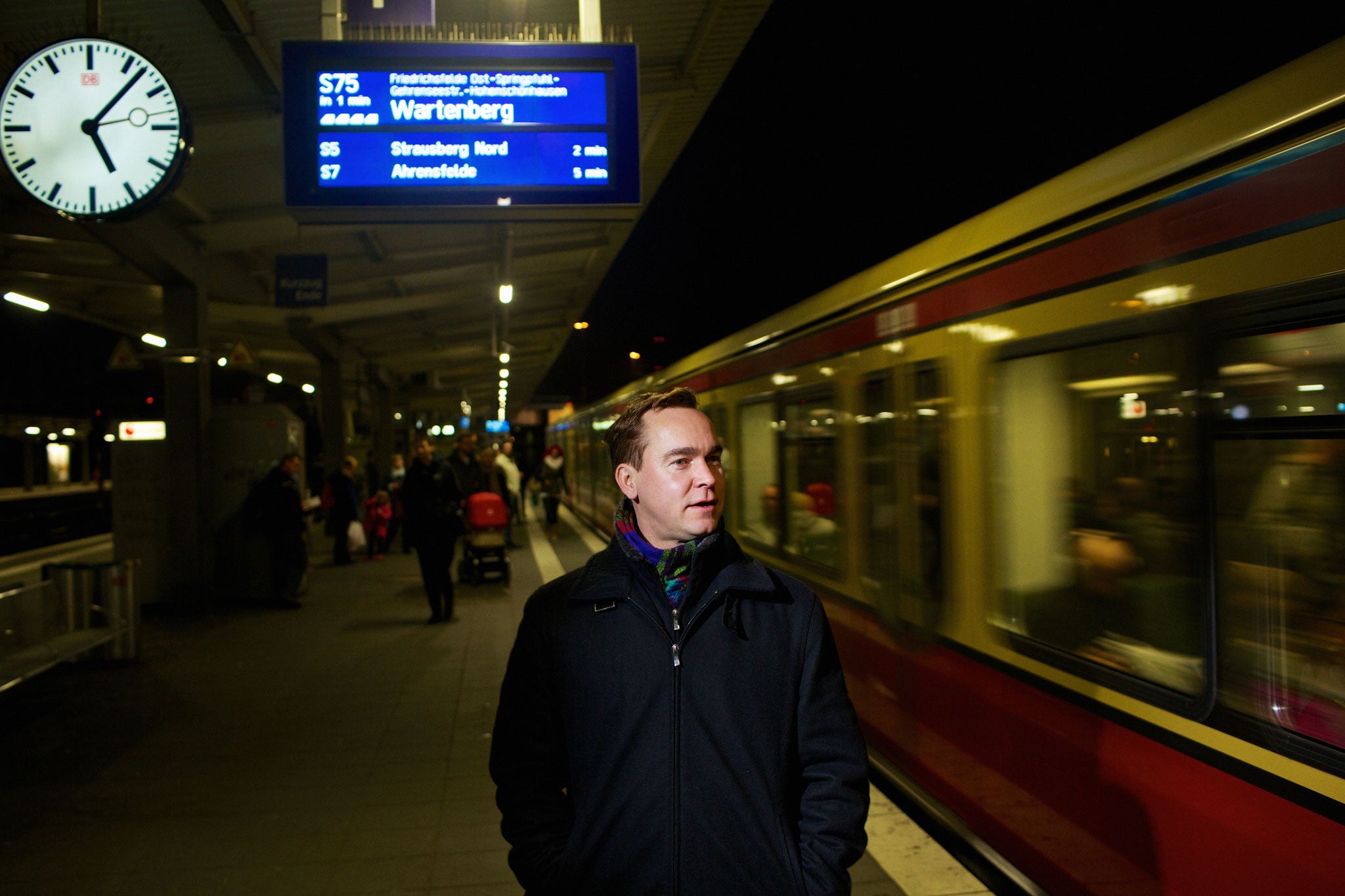Modern Berlin through the eyes of one of the city's last escapees from the East
Frank Cieszynski is an Airbnb 'super host' based in west Berlin and escaped to the West just two days before the wall fell

Your support helps us to tell the story
From reproductive rights to climate change to Big Tech, The Independent is on the ground when the story is developing. Whether it's investigating the financials of Elon Musk's pro-Trump PAC or producing our latest documentary, 'The A Word', which shines a light on the American women fighting for reproductive rights, we know how important it is to parse out the facts from the messaging.
At such a critical moment in US history, we need reporters on the ground. Your donation allows us to keep sending journalists to speak to both sides of the story.
The Independent is trusted by Americans across the entire political spectrum. And unlike many other quality news outlets, we choose not to lock Americans out of our reporting and analysis with paywalls. We believe quality journalism should be available to everyone, paid for by those who can afford it.
Your support makes all the difference.On 9 November last year, a wall of cardboard boxes 10 feet high reached halfway to the shadowed ceiling of a disused electrical substation in central Berlin.
As guests entered (the accommodation-sharing website) Airbnb's party to commemorate the 25th anniversary of the Mauerfall, they were made to hit a buzzer assigning them to either side of 'the wall': East or West.
Inside, we stood three-deep at the free bar and posed for photos in set-ups of 1980s German living rooms; all brown and beige and flammable-looking, while bouncers in the 'East' did their best Stasi impressions, remonstrating aggressively with any punter who came too close to the cardboard wall.
As midnight approached, a projector screen unspooled from the ceiling and, after a few technical glitches, a video played. It told the story, in folksy animation backed by a swirling Disney score, of an ex-German Democratic Republic (GDR) guard who, returning to Berlin with his daughter, recognised his Airbnb host as a former West German counterpart. Reunited by the serendipitous letting of the latter's box room, they became friends. 'Airbnb, belong anywhere,' read the sign-off.
"We're all about breaking down barriers between everyday people and strangers," an Airbnb spokeswoman told me afterwards.
As the clock struck 12, the bouncers fell back. The revellers, liberated and well-plied, smashed through the cardboard barricade before them to be reunited with their friends on the other side. The DJ ramped up the music. And the few people old enough to remember the concrete, barbed wire and bullets of the real thing stood well back, looking a little uneasy about this Silicon Valley marketing department's blue-sky reworking of history.
The next evening, I am scheduled to meet Frank Cieszynski. He is an Airbnb 'super host' based in the Wilmersdorf neighbourhood of west Berlin.
A 19-year-old student at the prestigious State Ballet School of Berlin in 1989, he escaped to the West just two days before the wall fell. Over the course of the night, as the weekend-long commemorations wrap up, we will pace the city streets in the crisp November air. Frank will show me the city he remembers, divided.
We meet under sodium lights on the S-Bahn platform of Lichtenberg station and start at the beginning.
On 5 November, 1989, Frank's friend Marco paid him a visit at home.
"In those days, we had no mobile phones and no home phone," Cieszynski says. "You had to go to people's houses to talk to them. My mother always prepared two cakes on the weekend because you never knew when people might show up."

Marco put it to him simply: "'Let's leave this country,' he said." Without hesitation, Cieszynski agreed. Poring over a treasured atlas as a child, he had cultivated a desire to travel. And Eastern marks could only get you so far.
"I always had this dream to go to Siberia in winter," he says. "Since I was 11 years old, I wanted to travel to the coldest big city on Earth, to Yakutsk. "
A train shudders to a halt in a hydraulic whoosh. Passengers swaddled in coats bustle past, plumes of breath hanging behind them in the late-evening air. It was from here that Frank, Marco and a third friend Guido would travel south to Prague and then back north to West Berlin through Bavaria. For all they knew leaving the East for good. "Somehow all the riskiness and worries didn't cross my mind," Frank says. "I don't know why. I just thought: it can only get better."
History's casual disregard for individual plans meant Cieszynski would arrive in West Berlin just hours before the checkpoints opened – then find himself struggling back East, against a tide of people, to salvage belongings from his apartment before they closed again, as he assumed they inevitably would.
"The East Germans were more eager to go to the West than the West Germans were to go to the East," he says with a wry smile.
Frank next takes me to the Ballet School in the old East Berlin. Inside, laughter echoes off the walls. Classes have just finished. Boys in leggings and girls in tutus with jumpers pulled over bounce around clutching gym bags. Parents chat distractedly, gesturing to children to keep close.
"At the age of eight, I started to do sports, like swimming and gymnastic; always things to do with movement," Cieszynski explains. Responding to a newspaper ad for new ballet students, he was accepted and began to board.
His new life left him with mixed feelings. School was very disciplined. But the students were relatively well-off. At the weekends, they visited the Schoppenstube disco and danced to bootlegged Madonna records. They mixed with West Berliners at The Grand Hotel's Cafe Bauer and listened to Western pop on radio in the American Sector.
Then, on a trip to perform in Aberdeen in 1986, Cieszynski snuck into a travel agents, grabbed a handful of brochures, and smuggled them back to Berlin. "With those beautiful palm trees... we didn't have pictures like that. Every day I went through the pictures and dreamt myself to those places." The rest of the world was tantalisingly close – but still too far away. Back in the car, driving through the night, down wide boulevards, Cieszynski asks if I know Lisa Stansfield. "'All Around the World', that was my fall of the wall hit. When I hear that song, I'm back in those days of change."

We arrive at the site of the Bornholmer Strasse border crossing – the first to be breached on 9 November, 1989. Cars whizz and clunk on to the steel-girdered Bösebrücke Bridge that disappears out over train lines below. Billboard-sized black-and-white photos stand testament to the place's history. As Cieszynski poses for a picture beneath a streetlight, a woman walking her dog stops, stares and shuffles off into the darkness.
The chain of events that came to pass here are remembered as a victory of human will. But it was set off by a bureaucratic oversight. At a press conference, a poorly-briefed GDR government spokesman answered a journalist's question – seeming to imply that every citizen was free to travel to the West with immediate effect.
By 9pm, a crowd had gathered at the checkpoint. With no decisive orders from on-high, the guards let through a few people to ease the pressure. But the crowd grew and those gathered soon began to chant, "Open the gate! Open the gate!". At 11.30pm, with few other options – and high-command asleep in Moscow – the guards raised the barrier and the trickle turned to a flood.
Cieszynski, meanwhile, had spent the past three days travelling in a 1,100-mile loop. After a night spent in a Bavarian refugee camp, he headed on to Dusseldorf from where he took a flight to West Berlin. Leaving his suitcase at a friend's apartment, he headed to a bar at around 6pm. Three hours later, news of the press conference started to spread.
"We heard that the wall was open and we had to see for ourselves. We came here, to Bornholmer Strasse, and saw all the people coming through and thought 'Well, let's go to my place to get my stuff'," he says.
I ask if there is anything from the East that he misses and he falls silent for a moment. "In a society where there are many people who have not much, people help each other more, because you cannot just go out and buy something. That's what I missed later on – what many people say about East Germany: the people were more together."

Earlier that day, close to Checkpoint Charlie, a large banner hung from a nearby building. It read, 'Dear Berlin guests! Do not use Airbnb!'. A representative for the company insisted to me it was placed there by a disgruntled former renter whose lettings fell short of toughened standards.
But, heralded as a leading plank in the 'sharing economy', Airbnb's utopian mission has soured a little of late. City officials, concerned that the service is contributing to the demise of Berlin's famously cheap housing stock, have recently limited residents' ability to let properties in which they do not live. Similar action has been taken in New York City, Barcelona and Paris.
I ask Cieszynski whether he feels Airbnb has made his city a more connected or a more dislocated place? Whether, I suggest, the 'sharing economy' has brought back some of that human togetherness? He thinks it has.
For Airbnb's part, in a blogpost on their website, German housing expert Daniel Hoffman says: "The tense housing market is a complex problem that is being driven by migration and a lack of new homes being built – not people sharing their homes through Airbnb."
It is late as we arrive at The Westin Grand Hotel in the old East. Only a few of the tables in the central lobby are taken. They sit beneath an octagonal atrium that rises 10 floors up to a glass ceiling. A staircase sweeps through the centre. Tinkling piano notes mix with the warm hum of conversation.
Cieszynski and his friends used to come here for ice-cream. "It was beautiful and you could only get it in this hotel. It was cinnamon ice-cream with green pepper, hot cherries and cream."
The hypocrisy behind the gilded façade was not lost on Frank. While East German marks were accepted in the café, rooms could only be paid for with currency from the West.
"They said, 'That's the enemy over there'. But the enemy got the best hotel to stay in because he has the money that we want. That's not honest. Everyone knew it was unfair but you wouldn't say that because you'd get into trouble."
So, I ask, as we signal to the waitress for die Rechnung, did he ever make it to Yakutsk? "Yes!" he says, clapping his hands together. "I went there in summer in 2004. We took a cruise from Yakutsk, north up the Lena river to the polar sea."
Within a year of the wall coming down, Cieszynski had visited Thailand and Tunisia before taking a job as a dancer on a cruise ship that sailed, on his first voyage aboard, from Venice to Norway. How did the reality compare to his atlas, I ask? "It was better," he says. "It was like a dream. Like when you think, 'I hope I don't wake up now. Please let this be reality'".
To book a stay with Frank Cieszynski, visit airbnb.co.uk (tinyurl.com/frankairbnb), £44 per evening with a minimum two-night stay
Party menschen
Berlin is famous for its through-the-night partying. Here are three clubs which go straight through the weekend:
Berghain
This behemoth, situated in a converted power station, is famed for its mix of hedonism and techno. Berghain.de
Watergate
In the heart of hip Kreuzberg, Watergate hosts DJs playing a broad mix, from hardcore to disco – and has a flashing dancefloor to boot. Water-gate.de
Weekend
Taking up the 12th and 15th floors – plus the roof terrace – of a Soviet tower block, Weekend is the place to see the sunrise over the city, drink in hand. Week-end-berlin.de
Join our commenting forum
Join thought-provoking conversations, follow other Independent readers and see their replies
Comments